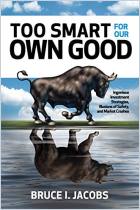Join getAbstract to access the summary!

Join getAbstract to access the summary!
Didier Sornette
Why Stock Markets Crash
Critical Events in Complex Financial Systems
Princeton UP, 2003
What's inside?
Can you read the tea leaves that portend a crash? Just try applying science to the behavior of financial markets.
Recommendation
The word crash strikes fear into any investor’s heart. Fear not, writes scientist Didier Sornette, who has crunched the numbers (not to mention the probabilities and log periodicities) and has determined that crashes are, in fact, quite normal and predictable. If prices are soaring and everyone you know says profits are guaranteed, get ready. Sornette backs up his argument with countless charts, formulas and phrases such as "spontaneous symmetry-breaking regime." Still, there’s enough plain English here to enlighten the lay reader. getAbstract suggests this book to traders and investors looking for a unique analysis of market crashes.
Summary
About the Author
Didier Sornette is professor of geophysics at the University of California, Los Angeles, and a research director at the Centre National de la Recherche Scientifique in France. Sornette specializes in scientifically predicting catastrophes in complex systems. He is the author of the textbook Critical Phenomena in Natural Sciences.






















Comment on this summary